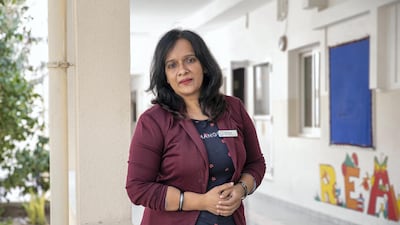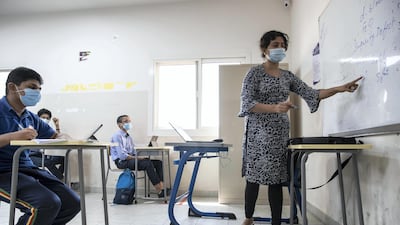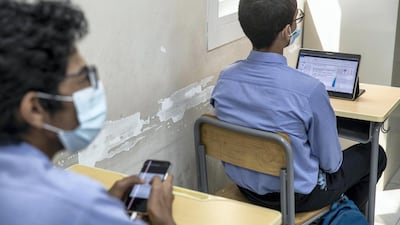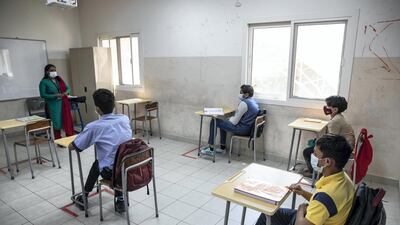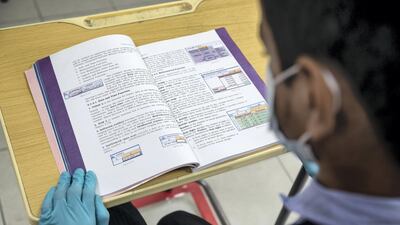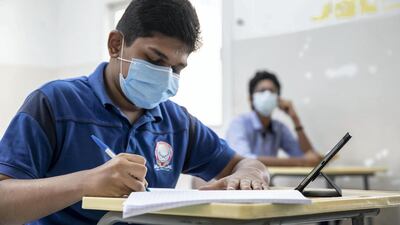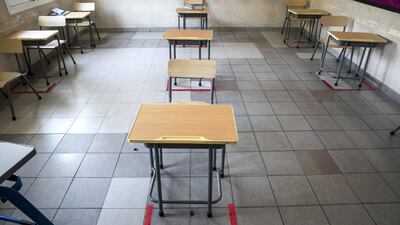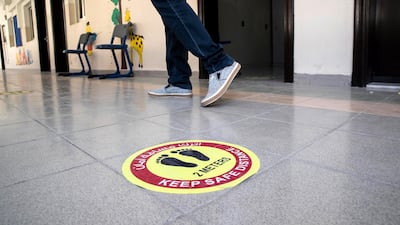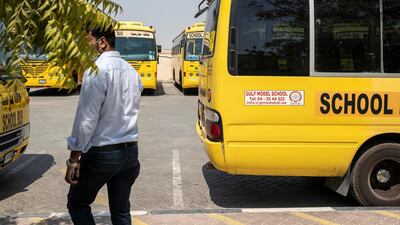Limited budgets, building in-house clinics and hiring nurses were among the requirements affordable schools in Dubai had to contend with when preparing for the next school year.
Some schools closed sections of their buildings to cut utility costs, while others made in-house signage and posters with the help of teachers and pupils to reduce costs.
Thousands of pupils returned to school in August and the Knowledge and Human Development Authority – Dubai's private schools regulator – released a raft of safety measures to limit the spread of Covid-19.
For many schools, implementing these rules meant significant financial commitments, even with limited resources.
Support and clear guidelines from health and education authorities has helped schools prepare.
"We had to set up a small isolation room, a consultation room and all of this is a big expense for an affordable school," said Shiny Davison, director of learning at Gulf Model School in Dubai, which charges Dh356 a month for kindergarten to Dh647 for grade 12.
Of 2,300 pupils enrolled at the school, 300 pupils are back for in-person classes and Ms Davison said the school went over its budget to equip a clinic and recruit healthcare professionals.
"Earlier for 1,000 children, we needed to have a permanent doctor but according to the requirements we now have one doctor and three nurses," she said.
"We had to include an extra nurse and setting up an isolation room was a challenge for an affordable school... It was a necessity and we did it.
"It was difficult for us to get nurses as the majority of these were employed at hospitals during the pandemic."

Ms Davison said the school spent between Dh10,000 and Dh20,000 to prepare the clinic.
The school’s pupils and staff designed their signage and posters for social distancing and handwashing, and printed these in-house.
Indian High School, a non-profit facility, has more than 17,000 pupils, making it the UAE’s largest school. To meet safety measures, the school is operating at 50 per cent capacity for in-person classes. Pupils attend the school on certain days of the week.
"We are one of the most economic schools in the region with an average fee point of Dh550 per month," said the chief executive of Indian High School, Punit Vasu.
"The safety measures [announced by authorities] were not very cost prohibitive. The guidelines were such that all schools could follow."
Around 3,000 to 4,000 pupils are back at the school for in-person classes.
"Our biggest challenge was that just before schools reopened the number of Covid-19 cases spiked. This was demotivating for us and for parents," he said.
The school created awareness videos and informed parents through online groups.
Affordable schools are cutting costs by using resources wisely, said Rashmi Nandkeolyar, principal of Delhi Private School in Dubai which has more than 3,800 pupils. The school charges Dh10,298 per year for kindergarten and Dh14,416 for grade 12.
"We closed one block, which meant we saved on electricity and water bills," said Ms Nandkeolyar.
She said a key task for affordable schools was following social distancing restrictions.
"We cannot have 4,000 pupils on the campus at the same time as we do not have space," said Ms Nandkeolyar.
At present, pupils are at the school for-person classes twice a week while many join online.
At The Winchester School in Jebel Ali, where annual fees ranged from Dh13,800 for foundation stage one to Dh30,800 for year 13, around 900 of 4,200 pupils were at the school for in-person classes daily.
Bringing all pupils back was a priority for the school where pupils have been divided in two groups and attend in-person classes two-three days a week.
"We cannot have all pupils in every day of the week so we have made groups," said Meenakshi Dahiya, principal at the school.
Though parents had committed to in-person classes, some went back on the decision due the recent rise in cases, she said.
